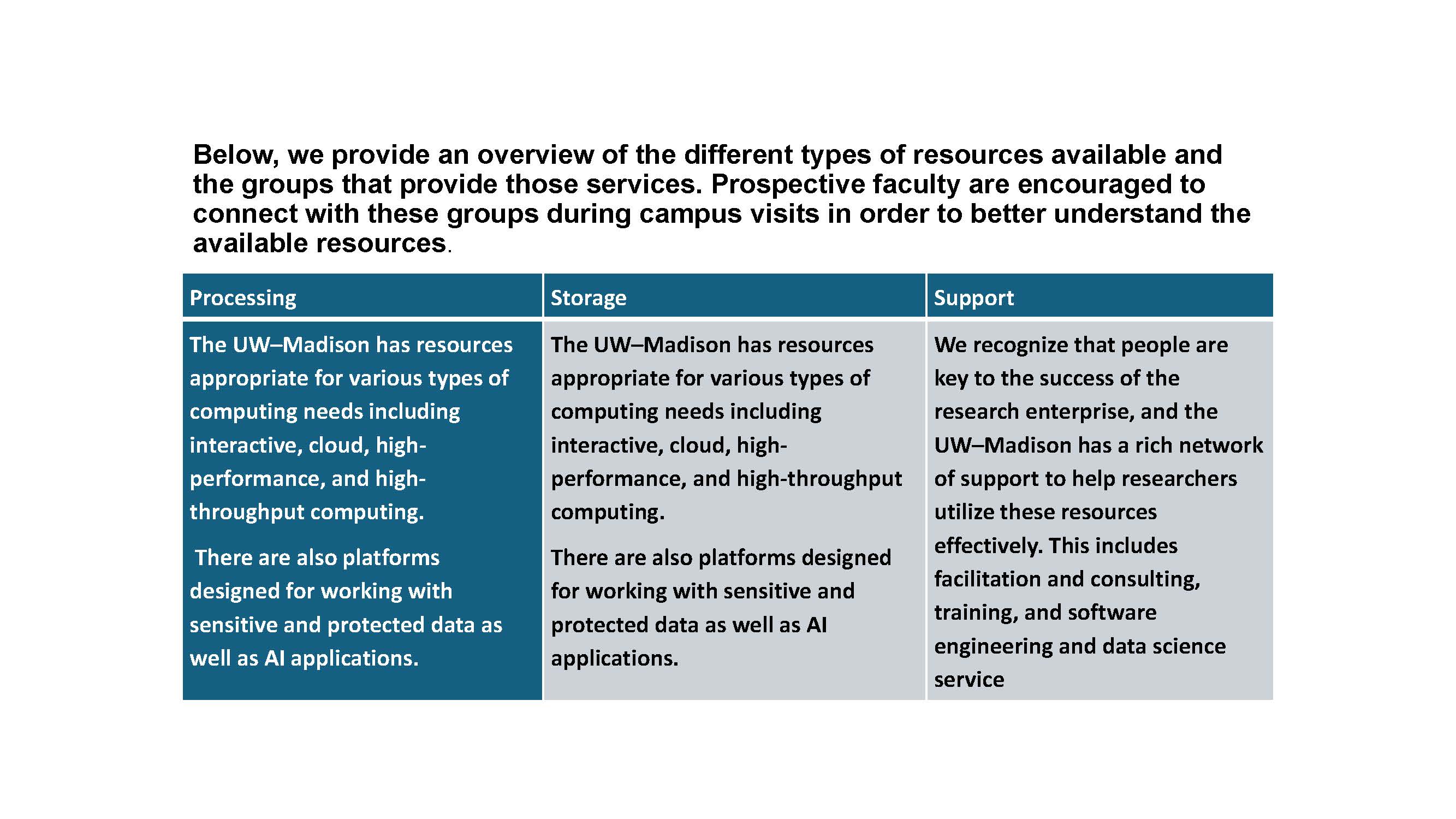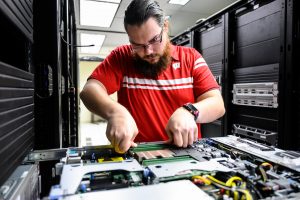Research Computing Support

As one of the nation’s premiere research universities, the UW–Madison has vast research computing infrastructure.
This infrastructure includes resources that address various types of processing and storage needs as well as a robust network of facilitators and service providers to support research. Some of these resources are concentrated in organizations that specialize in the patterns and needs of individual research communities, and some are provided centrally.
Some resources are provided at no charge, and some have fees or require memberships.Below, we provide an overview of the different types of resources available and the groups that provide those services. Prospective faculty are encouraged to connect with these groups during campus visits in order to better understand the available resources.
"We proudly provide a service-based approach to research computing at the UW–Madison, offering many free services that are beneficial to both faculty and the institution," says Dorota Brzezinska, UW–Madison Vice Chancellor for Research. "Without the right tools, no scientist can keep up with new research trends and funding efforts. We provide the necessary computing tools from high-memory servers to robust data storage and personalized consultations, to allow our researchers to be competitive and collaborative. We are continually enhancing and investing in the right tools to maximize our research productivity and insure data security to adapt to the fast-paced and evolving research environment."


Processing
- These resources are appropriate for researchers that need to process significant amounts of data or perform large numbers of numerical simulations.
- The Center for High Throughput Computing (CHTC) manages a large-scale High-Throughput Computing system of 20,000 cores and hundreds of GPUs available to all researchers at the UW-Madison campus and also provides access to HTC capacity beyond the campus.
- The Social Science Computing Cooperative (SSCC) manages a 5,000 core Slurm cluster, including four GPUs. The Slurm cluster is tightly integrated with the SSCC’s interactive Linux cluster (Linstat), so jobs can be easily developed and then scaled up.T
- High-performance computing (HPC) provides researchers with the computing resources needed to tackle challenging numerical simulations that may require large amounts of memory or that are bottlenecked by processing speed. This involves configuring computing clusters to create supercomputers that run applications that use specialized software (i.e. MPI) to achieve internal parallelization of work across multiple servers of dozens to hundreds of cores. The Center for High Throughput Computing (CHTC) manages a 5,000 core High-Performance Computing cluster.
- The Social Science Computing Cooperative’s Slurm cluster of 5,000 cores is also capable of high-performance computing.
Cloud computing is a model that provides on-demand access to computing resources, such as storage and processing power, over the internet. The university supports multiple cloud computing platforms and services including: AWS (Amazon Web Services), GCP (Google Cloud Platform), and Microsoft Azure. The university provides reduced facilities and overhead charges, discounts for NIH-funded research, consulting, and security protections.
- The primary resource for GPUs on campus is provided through the CHTC. CHTC provides access to hundreds of GPUs through a general-use pool in the GPU Lab and through prioritized resources for individual research groups.
- The Social Science Computing Cooperative (SSCC) has a small number of GPUs available in its Slurm cluster, and two in its Silo environment for working with sensitive or restricted data.
Some research involves sensitive or protected data. In particular, the HIPAA Privacy Rule establishes national standards to protect individuals' medical records and other individually identifiable health information. UW–Madison has multiple computing platforms that are designed for working with these kinds of data. The primary resources include:
- Platform X is a managed Azure platform with enhanced HIPAA security and privacy protections for working with protected health information. Provides cloud-based virtual workstations with standard and project-specific software for data analysis by research teams. (Resource provided by the School of Medicine and Public Health (SMPH) Informatics and IT).
- Platform R is an on-premise High-Performance Computing cluster provided by SMPH designed to specifically support Genomics and Imaging researchers.
- Silo: The Social Science Computing Cooperative provides a remotely accessible high-security computing environment for working with HIPAA and other sensitive or restricted data. It contains Windows servers, interactive Linux servers, and a small Slurm cluster for High Throughput Computing with one GPU server (two GPUs).
- These resources provide computational resources with an interactive experience, which is great for prototyping and development. Resources include:
- The Research Cyberinfrastructure group manages the Data Science Research Platform, which is great for interactive notebooks written with RStudio/Posit and Python or for developing and deploying Shiny Apps.
- The Social Science Computing Cooperative (SSCC) manages a Windows compute cluster, Winstat. Winstat provides a familiar Windows-based environment, but with more cores and memory than a typical laptop, high-speed access to data storage, and a wide variety of statistical software. This makes it popular with researchers who need more computing power but aren’t yet ready to make the leap to Linux.
- The SSCC’s Linstat cluster is accessible via web-based interfaces like Open OnDemand, RStudio Server, JupyterLab, and SAS Studio or a standard login shell. It can be used to run jobs of moderate size as well as to develop larger jobs to be run on the SSCC’s Slurm cluster.

Data and Storage:
- Research Drive: Provides secure, shareable storage space on the UW–Madison campus network. ResearchDrive is a university-wide file storage solution for faculty PIs, permanent PIs, and their research group members. It is suited for a variety of research purposes, including backup, archive, storage for data inputs/outputs of research computing and others. It is a secure and permanent place for keeping data. (Resource provided by the Division of Information Technology (DoIT) Research Cyberinfrastructure)
- Research Object Storage (S3): Provides secure, shareable storage space on UW-Madison’s on-premise S3 object storage system for faculty PIs, permanent PIs, and their research group members. It is suited for long term archival storage, back up, integration with instruments and computing resources, and hosting static web content. (Resource provided by DoIT Research Cyberinfrastructure)
Many researchers need access to data that require data use agreements. Researchers can work with Research and Sponsored Program to secure data transfer and use agreements. In addition, the Social Science Research Services, the IT staff in the School of Medicine and Public Health as well as the Wisconsin School of Business often provide guidance on these topics.
- Research Data Services (RDS) is a no-cost resource for anyone on the UW-Madison campus that provides consultations, best practice information, and education and training on research data management and sharing. They help researchers comply with federal public access requirements and help make your data citable, reproducible, and publicly accessible.
- UW-Madison has a membership to Dryad. You can deposit up to 300GB of research data per deposit at no cost via UW-Madison’s membership. Dryad is an open-access, generalist data repository with a number of benefits including minimal curation, publisher integrations, and deposited code and scripts being automatically preserved in Zenodo. Learn more and create your account.
- MINDS@UW is UW’s open access long-term institutional repository for sharing and archiving scholarly outputs such as data, manuscripts, technical reports, conference proceedings, etc. It is available to UW-Madison researchers at no-cost currently and can support sharing of datasets over 300GB.
Risk Management and Compliance: Services and resources provided by the Office of Cybersecurity.

Services and Support:
- CHTC’s Research Facilitation team empowers researchers to utilize computing to achieve their goals. The Research Facilitation approach emphasizes teaching researchers skills and methodologies to manage & automate workloads on resources like those at CHTC, the campus, or across the world.
- The SSCC’s statistical consultants provide consulting and training for social science researchers on statistical and data science topics. They are experts on the most popular statistical software and can answer many methodological questions. They also act as research computing facilitators, assisting researchers in using the SSCC’s computing resources. The SSCC has an extensive statistical computing knowledge base.
- The Data Science Hub Facilitators can recommend learning pathways and project strategies, help troubleshoot code, and liaise contacts with collaborators and data science experts.
- The Statistical Consulting Group, part of the Department of Statistics provides UW faculty, staff, and students with assistance in all the statistical aspects of research, from project development through publication.
- The Data Science Institute has a professional staff of data scientists and research software engineers that work with researchers to develop tools for research.
- The Open Source Program Office within the Data Science Institute provides training for software development and supports internships focusing on open source software products connected to research.
- The TRAD group in DoIT partners with instructors, researchers and other members of the university community to design and implement innovative custom software solutions.
The Data Science Institute’s data scientists and research software engineers collaborate with researchers to build solutions tailored to their needs. DSI works with researchers and teams across campus to provide data science capacity and increase the competitiveness of proposals. They can partner with researchers on proposals for extramural funding with a data science componen
- The Data Science Hub offers regular trainings (including Carpentries workshops) around fundamental data science and computational skills.
- As part of their Grad Student Support Series, the UW-Madison Libraries offer short workshops that teach programming skills for researchers.
- The Social Science Computing Cooperative’s training program provides introductions to statistical software and fundamental data wrangling skills, plus a variety of applied statistics and data science topics.

Service Providers:
CHTC offers UW–Madison researchers computing and data services that aim to empower their research and teaching mission. CHTC is an excellent resource if you know your computational work is going to grow in scale beyond what is reasonable to manage and support in your in-house computing environment - or if you are interested in the idea of scaling up your computational work!
The Division of Information Technology (DoIT) Research Cyberinfrastructure group is a research-focused team within the Division of Information Technology. They provide services, support, and consultations for data storage and management, cloud computing, and data visualizations. They partner with operational groups within central IT to provide services with high availability and security. They collaborate with Schools and Colleges to develop connecting infrastructure between departmental and central resources for research computing.
SMPH Research Informatics Team is dedicated to optimizing the conduct of high-quality clinical and translational research and providing the needed computational and informational infrastructure for investigators at UW-Madison and Marshfield Clinic. They assist investigators during project conceptualization, grant submission, and deployment of secure data storage and processing methods.
The Social Science Computing Cooperative (SSCC) supports researchers at UW-Madison who use statistical analysis in their work. They provide a complete research computing environment focused on statistics plus the expert help you need to use it. This includes Windows and Linux based servers and statistical consulting. The SSCC is funded by its members, and most of its services are only available to members of the Cooperative (SSCC training is an exception). Memberships are available for individuals, research groups, and larger units.
- Research Data Services (RDS) is led by the Libraries and partners with Research Cyberinfrastructure, Ebling Library, and the Map Library to provide no-cost support to the UW–Madison campus. RDS is supported by twelve data professionals with unique domain expertise from all across the campus. RDS provides expertise in data management, data sharing, and interoperability to help UW-Madison researchers make their data citable, reproducible, and publicly accessible. Services include training and workshops, templates, resources and best practices, referrals, and individual consultation across the lifecycle of research projects. Currently, RDS services are available to UW-Madison investigators at no charge.
- The Public Access Service provides researchers and administrators with time-sensitive approaches to publication compliance that compliment their work flow. Free services include the NCBI My Bibliography check-up review; custom compliance reports for NSF, DOE, DoD or other non-NIH awards; and publication submission to agency repositories (note: NSF does not allow for 3rd party submission).
The Data Science Institute (DSI) is central to the university’s strategic priority to grow its research enterprise and expand its global impact. The DSI has a professional staff of data scientists and research software engineers that support campus researchers through its data science services. In addition, DSI has a large group of affiliated faculty and staff from across campus that advance the state of the art in data science through multidisciplinary, use-inspired research.
The Data Science Hub in the Wisconsin Institute for Discovery collaborates closely with the Data Science Institute to provide data science training and implement data science into research practices across campus. The Data Science Hub executes a mission for community engagement and learning opportunities for campus researchers through a variety of services, including:
- Regular trainings (including Carpentries workshops) around fundamental data science and computational skills
- Consultations with Data Science Facilitators who can recommend learning pathways and project strategies, and liaise contacts with collaborators and data science experts.
- Community events and co-sponsored seminars that bring together researchers and other partners around relevant data science topics.
The Teaching & Research Application Development (TRAD) service partners with instructors, researchers and other members of the university community to design and implement innovative custom software solutions.
